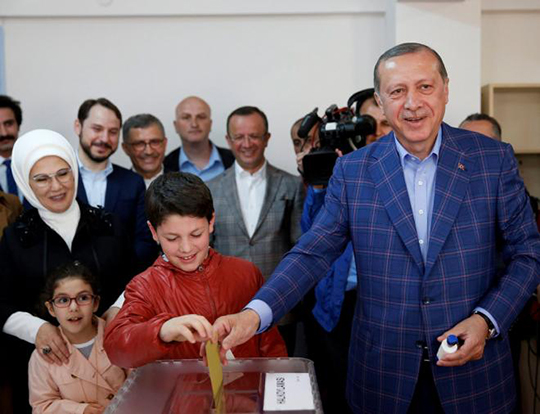Istanbul, Apr 17: Turkish President Recep Tayyip Erdogan declared victory today in a historic referendum that will tighten his grip on power, but the knife-edge result left the country bitterly divided, with the opposition crying foul.

Opponents fear the sweeping constitutional changes, which would grant Erdogan more power than any leader since modern Turkey's founder Mustafa Kemal Ataturk and his successor Ismet Inonu, would lead the country to one-man rule.
The result could also have even wider implications for Turkey which joined NATO in 1952 and for the last half-century has set its sights on joining the European Union.
The 'Yes' campaign won 51.3 percent of the vote against 48.7 percent for 'No', the election commission said in figures quoted by state news agency Anadolu, in a count based on 99 percent of the ballot boxes.
As huge crowds of flag-waving supporters celebrated, Erdogan praised Turkey for taking a "historic decision".
"With the people, we have realised the most important reform in our history," he added.
The referendum was held under a state of emergency that has seen 47,000 people arrested in an unprecedented crackdown after the failed military putsch against Erdogan in July last year.
In a nail-biting end to a frenetic campaign, the 'No' share of the vote climbed as more ballots were counted, after lagging well behind in the early count, but failed to overtake the 'Yes'.
"The presidential system, according to unofficial results, has been confirmed with a 'Yes' vote," Prime Minister Binali Yildirim told jubilant supporters from the balcony of the headquarters of the ruling Justice and Development Party (AKP) in Ankara.
"This is a decision made by the people. In our democracy's history, a new page has opened," said Yildirim, whose job will disappear under the constitutional changes.
The victory margin was less than predicted by the authorities and in an interview with state television on Friday, Erdogan had predicted a far clearer victory saying polls showed a 55-60 percent share of the vote.
But voting patterns showed Turkey deeply divided over the changes, with the 'No' vote victorious in the country's three biggest cities.
The 'Yes' vote held up strongly in Erdogan's Anatolian heartland but the Aegean and Mediterranean coastal regions and Kurdish-dominated southeast had backed the 'No' camp.
In a major disappointment for the president, the 'No' vote was just ahead in his hometown of Istanbul and in the capital Ankara and clearly ahead in the third city of Izmir.
But Turkey's two main opposition parties said they would challenge the results after alleged violations.
The pro-Kurdish Peoples' Democratic Party (HDP) said it would challenge two-thirds of the votes, saying: "There is an indication of a 3-4 percentage point manipulation of the vote."
The deputy head of the Republican People's Party (CHP), Erdal Aksunger, also said it could appeal up to 60 percent of the vote.
"Believe me, this election is not over," he told CNN Turk, quoted by the Dogan news agency. "This is totally invalid. We are declaring this here."
The opposition had already complained that the referendum has been conducted on unfair terms, with 'Yes' posters ubiquitous on the streets and opposition voices squeezed from the media.
Closely watched on Monday will be the initial assessment of the international observer mission of the OSCE Office for Democratic Institutions and Human Rights (ODIHR) and the Parliamentary Assembly of the Council of Europe (PACE).
Erdogan again warned Brussels the he would sign any bill agreed by parliament to reinstate capital punishment, a move that would automatically end Turkey's EU bid.
If the opposition failed to support the bill, Erdogan said another referendum could be held on reinstating the death penalty.
Western reactions to the referendum outcome will be crucial after Erdogan accused Turkey's allies of failing to show sufficient solidarity in the wake of the July 15 failed coup.
Erdogan said: "We would like other countries and institutions to show respect to the decision of the nation."
The new presidential system would dispense with the office of prime minister and centralise the entire executive bureaucracy under the president, giving Erdogan the direct power to appoint ministers.
The system would come into force after the elections in November 2019. Erdogan, who became president in 2014 after serving as premier from 2003, could then seek two more five- year terms.
Supporters see the new system as an essential modernisation step for Turkey that will remove the risk of the political chaos that blighted the 1990s and is blamed for the 2000-2001 financial crisis.
Opponents fear it risks granting Erdogan authoritarian powers and allow him to ride roughshod over key institutions like the judiciary and parliament.
"I don't think he (Erdogan) will reverse course. I don't think Erdogan will change the robust and muscular approach to politics that he has adopted so far," said Fadi Hakura, Turkey expert at London-based Chatham House think tank.






Comments
Add new comment